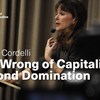distributionen
Sufficiency and the Distribution of Burdens
In: Mosquera, J. & O. Torpman (ed.), Studies on Climate Ethics and Future Generationsvol. 6. Working Paper Series 2024:10–17 Abstract A common objection to sufficientarianism is that it allows large
A Critical Human Group Size and Firm Size Distributions in Industries
Journal of Bioeconomics, 21(2), 123-144 Abstract Initially taking a theoretical stance, this paper relates firm-level processes and size distributions of firms at the industry level. An analytically tra
Heavy-Tailed Distribution of Seclusion and Restraint Episodes in a State Psychiatric Hospital
2011. The Journal of the American Academy of Psychiatry and the Law39:1- 93-99.

Completed: Household-distributed national accounts: New perspectives on the distribution of income and wealth in Sweden, 1930-2020
This project examines new perspectives on economic inequality in Sweden.

Claim-based distributive theories
The overarching purpose of this project is to present a framework for claim-based distributive theories. Since scarcity is a ubiquitous societal problem, the project has wide-reaching relevance for society.
Input and output in distributive theory
Noûs 2021 Abstract Distributive theories evaluate distributions of goods based on candidate recipients’ characteristics, e.g. how well off candidates are, how deserving they are, and whether they fare b
Distributive justice, social cooperation, and the basis of equality
Theoria Abstract This paper considers the view that the basis of equality isthe range property of being a moral person. This view,suggested by John Rawls in hisA Theory of Justice(1971),is commonly dism
The normality assumption in coordination games with flexible information acquisition
Journal of Economic Theory, vol. 203, 2022. Abstract Many economic models assume that random variables follow normal (Gaussian) distributions. Yet, real-world variables may be non-normally distributed.

Chiara Cordelli: The Wrong of Capitalism Beyond Domination
Political philosophy is witnessing a revival of critiques of capitalism. Against those who argue that capitalism is unjust because of (i) its distributive outcomes, (ii) the oppression of workers at t

Anders Herlitz
I am a researcher at the Institute for Futures Studies and Professor of Practical Philosophy at Lund University. Previously I was Associate Professor in Practical Philosophy at Stockholm University an








